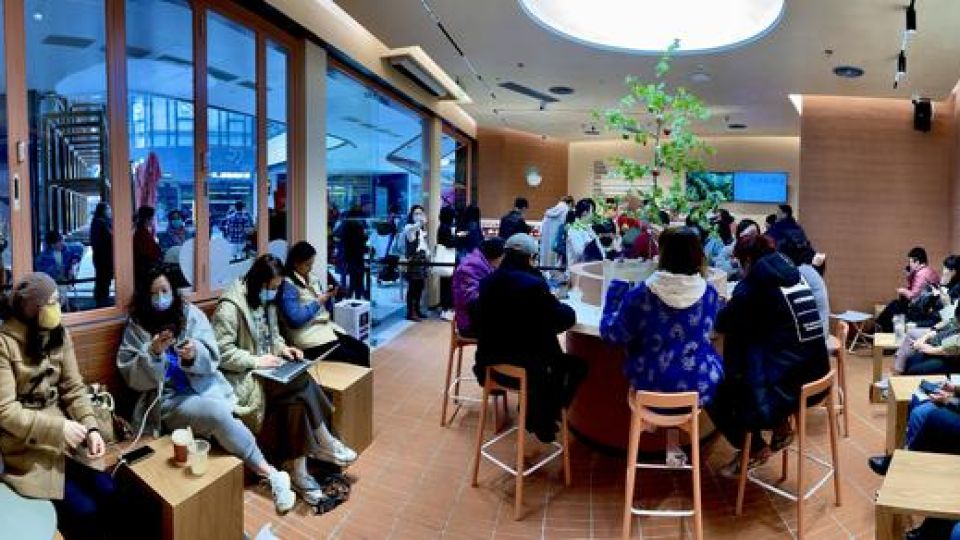September 26, 2022
BEIJING – A variety of Catimor beans grown in Southwest China’s Yunnan province has been a common sight in the global coffee market for decades.
For many years, the disparity in prices of the Yunnan coffee and its global counterparts on the New York Mercantile Exchange appeared to be an indication of a difference in quality. A lot of the beans that Yunnan exports are still used for making instant coffee.
Our purpose is to promote Yunnan coffee and to help more farmers. As such, we need to sell more coffee. Chinese consumers are becoming more discerning of what coffees they drink and are eager to try high-quality products.
Eric Baden, founder of Coffee Commune
But the perception of this type of beans has been changing in recent times, and one of the key figures behind it is a German, Eric Baden.
He raised eyebrows in 2019 when he won a silver medal at the Golden Bean coffee roasters’ competition in Australia using the Yunnan variety.
The problem all along, says Baden, was not the bean — but how people treated it.
“The focus of coffee production in Yunnan used to be about quantity, not quality. All one needs to do now is pay attention to the details, treat the Catimor with love, and its quality will shine,” he says.
“Coffee only grows between the tropics of Cancer and Capricorn. It cannot tolerate frost and it also suffers if temperatures are high. Arabica coffee is grown at altitudes between 1,000 and 2,000 meters. It needs decent rainfall throughout the year and fertile soil,” he adds. “Yunnan has all these criteria.”
Yunnan, the largest coffee cultivation region in China, has leveraged its high altitude and favorable climate to grow high-quality coffee beans.
Today, Baden is the founder of Coffee Commune, which sells 12 different single origin coffees and blends. All blends contain Catimor while single origin coffees are Yunnan, Ethiopia and Colombia.

Eric Baden, founder of Coffee Commune. (PHOTO PROVIDED TO CHINA DAILY)
According to Baden, Catimor beans are usually fruity and strong, and not as bitter as other types of beans.
Although coffee has always been an integral part of his daily life, Baden never thought of running a related business until he traveled to Yunnan in 2015 to obtain a coffee roaster’s certificate from a school in Pu’er city.
During the trip, Baden, who was then the head of a German chemical company, met Zhu Hewen, the co-founder of the school, and was taken on a tour of the coffee farms in the mountains.
The experience left such a deep impression on Baden that he decided to open the business along with Zhu in Shanghai in 2018.
“He took me to a small village of coffee farmers located way up in the mountains. That was the first time I saw for myself the harsh conditions these farmers had to endure,” recalls Baden.

Yunnan province, the largest coffee cultivation region in China, has leveraged its high altitude and favorable climate to grow high-quality coffee beans. (PHOTO PROVIDED TO CHINA DAILY)
During the trip, Baden discovered that the prices of coffee cherries had been sliding to the point that many of the small-scale farmers were making a loss from growing coffee. What exacerbated the situation was the need to sell their coffee cherries to intermediaries, which meant further losses.
“We later realized that we both wanted to help people like the coffee farmers improve their lives. That’s when we decided to set up Coffee Commune,” he says.
Leveraging his rich experience in corporate management, Baden took charge of building an organizational structure and establishing a sustainable business, while Zhu taught the farmers how to produce high-quality beans.
Even today, Baden travels to Yunnan regularly to help the coffee-bean growers learn how to use new, sophisticated equipment and invest in their business.
The key to improving their livelihoods, he says, is to provide them with direct access to the market and eliminate the need for middlemen who take up a chunk of the earnings.

Yunnan province, the largest coffee cultivation region in China, has leveraged its high altitude and favorable climate to grow high-quality coffee beans. (PHOTO PROVIDED TO CHINA DAILY)
It has only been about four years since the company started, but the company has already delivered results on different fronts.
For example, small-scale farmers now earn 3 yuan ($0.43) per kilogram of coffee cherries from Coffee Commune, up from just 1.5 yuan which they received from the intermediaries previously.
“This meant that they are able to make repairs to their homes and improve their plantations, and even save some money for a rainy day,” Baden says.
With Chinese consumers starting to become more interested in drinking coffee, Yunnan is also realizing the change. It aims to grow more premium beans.
Last month, the provincial government issued a document that mandated increasing the deep processing of beans and production of fine coffee products.
By 2024, the province aims to lift the rate of premium coffee bean production to 30 percent of its total output, and the deep-processing rate of coffee beans to 80 percent.
The guideline also says Yunnan will further develop related products such as coffee capsules, drip-bag coffee and coffee concentrates, to meet the increasingly diversified demand of coffee lovers.

Yunnan province, the largest coffee cultivation region in China, has leveraged its high altitude and favorable climate to grow high-quality coffee beans. (PHOTO PROVIDED TO CHINA DAILY)
According to Baden, more and more farmers in Yunnan are now eager to produce high-quality coffee beans after having seen the benefits they bring.
His company has opened another outlet in Shanghai’s Minhang district last year.
Awareness about the quality of Yunnan’s Catimor variety is also growing.
“These days, more and more people are eager to try Yunnan coffee and it is through this process that they find out how domestic coffee can be just as good as foreign ones,” he says.
“Many of our customers also want to find out more about Yunnan’s coffee beans and we’re always more than happy to tell them the story,” Baden says.
“Our purpose is to promote Yunnan coffee and to help more farmers. As such, we need to sell more coffee. Chinese consumers are becoming more discerning of what coffees they drink and are eager to try high-quality products,” he adds.
For this reason, Baden says they believe Shanghai is “the perfect place in China” to expand their business.
But their coffee will not be limited to Shanghai. The plan is to open more stores all over China. “We are also hoping to work with coffee farmers across the border, in Laos, Myanmar and Vietnam, in the future as well,” Baden adds.


